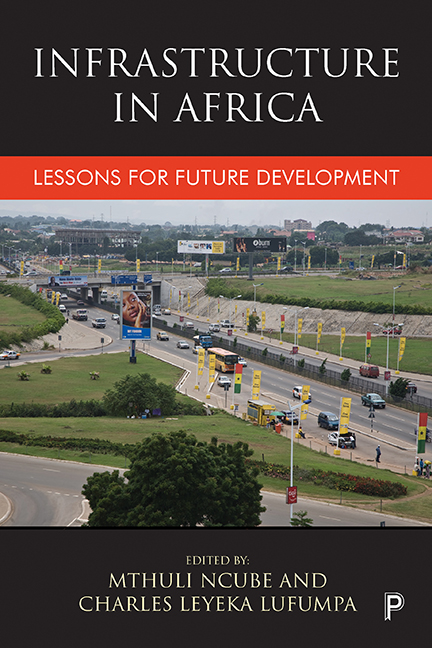Book contents
- Frontmatter
- Contents
- List of figures
- List of tables
- List of boxes
- Notes on contributors
- Acknowledgements
- Foreword
- Introduction: Infrastructure in African development
- Part 1 Spatial and demographic contexts
- Part 2 Sector-specific issues
- Part 3 Regional issues
- Part 4 Financing issues
- Part 5 Concluding remarks
- Index
Introduction: Infrastructure in African development
Published online by Cambridge University Press: 05 April 2022
- Frontmatter
- Contents
- List of figures
- List of tables
- List of boxes
- Notes on contributors
- Acknowledgements
- Foreword
- Introduction: Infrastructure in African development
- Part 1 Spatial and demographic contexts
- Part 2 Sector-specific issues
- Part 3 Regional issues
- Part 4 Financing issues
- Part 5 Concluding remarks
- Index
Summary
Background
This book is part of a series of studies commissioned by the African Development Bank (AfDB). Since 2010, a number of Market Studies on the Status of Infrastructure Development in Africa have been developed by staff of the Statistics Department of the Bank and other experts. Most of these papers have been prepared under the framework of the ongoing African Infrastructure Knowledge Program (AIKP), which is a successor program to the African Infrastructure Country Diagnostic (AICD) and is being led by the AfDB. The AIKP adopts a longer-term perspective than the AICD and provides a framework for generating knowledge about infrastructure on a more sustainable basis.
The AfDB will now take the leading role in the regular collection and assessment of infrastructure indicators, the production of knowledge products and timely policy analysis of emerging infrastructure trends in the continent to guide future policy and funding decisions, and to inform development policy and program management activities, as well as building infrastructure statistical capacity on the continent. This volume is intended to fulfill the analytic knowledge products component of the program.
Infrastructure not only enhances socioeconomic growth (Dalakoglou and Harvey, 2012; Easterly and Rebelo, 1993; Estache and Goicoechea, 2005), but it is also an important driver of sustainable development.Infrastructure is a key ingredient of Africa's post-Millennium Development Goals development agenda. For example, access to safe water supplies saves time and prevents the spread of waterborne diseases—including diarrhea and cholera, which are leading causes of infant mortality. Health and education services, as well as small businesses, can be established if there is a reliable energy supply. Good road networks provide links to markets, as well as enhancing access to producer and consumer services. Information and communications technology (ICT) democratizes access to information, thus strengthening governance and inclusion, as well as reducing transport costs.
Infrastructure comprises the stock of basic facilities and capital equipment required for society to function, including roads, bridges, rail lines, airports, schools, hospitals and other public works (Srinivasu and Rao, 2013). Because of the ‘negotiations’ over resources that precede the construction of any new infrastructure, power games often come into play. In this regard, a political economy— or anthropological—perspective, provides a stronger basis for understanding how infrastructure and related services come into being in a particular society.
- Type
- Chapter
- Information
- Infrastructure in AfricaLessons for Future Development, pp. 1 - 22Publisher: Bristol University PressPrint publication year: 2017
- 1
- Cited by



